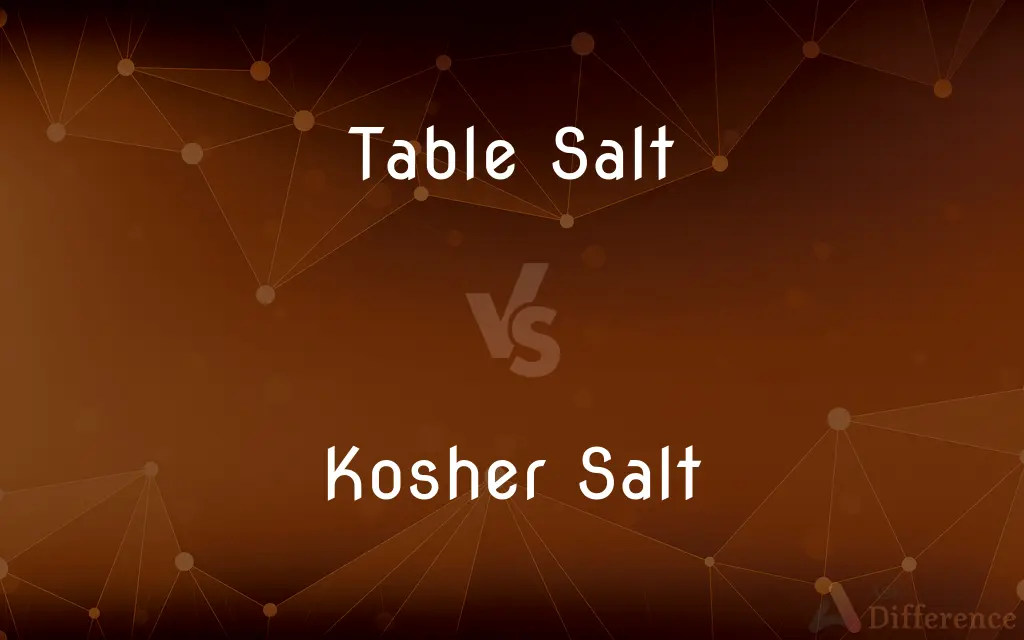Table Salt vs. Kosher Salt — What's the Difference?
By Tayyaba Rehman — Published on January 30, 2024
Table salt is finely ground with additives to prevent clumping, while kosher salt has larger, flakier crystals and usually no additives.

Difference Between Table Salt and Kosher Salt
Table of Contents
ADVERTISEMENT
Key Differences
Table salt, common in households, is finely ground and often contains additives like iodine and anti-caking agents. Kosher salt, characterized by its larger, coarse crystals, typically lacks these additives, offering a purer salt flavor.
The fine texture of table salt allows it to dissolve quickly, making it a go-to for baking and everyday cooking. In contrast, kosher salt’s larger flakes provide a more controlled seasoning process, preferred in meat curing and brining.
Table salt's compact grains mean it's denser than kosher salt, so volume measurements differ between the two. Kosher salt's larger crystals cover more surface area, making it less dense and allowing for a lighter, more even distribution.
In cooking, table salt is often used for precise measurements due to its uniformity. Kosher salt, with its coarse texture, is favored for its tactile quality, allowing chefs to pinch and sprinkle with more control.
The name 'kosher salt' comes from its use in koshering meat, where its large crystals are effective in drawing out blood. While table salt is a staple in many kitchens, kosher salt is gaining popularity for its versatility and flavor-enhancing properties.
ADVERTISEMENT
Comparison Chart
Grain Size
Fine and powdery
Larger, coarse flakes
Additives
Often contains iodine and anti-caking agents
Usually no additives
Dissolvability
Dissolves quickly
Dissolves more slowly
Density
More dense
Less dense
Culinary Use
General cooking, baking
Seasoning, curing, brining
Compare with Definitions
Table Salt
Table salt is dense and dissolves quickly, ideal for baking.
For precise measurements in baking, I use table salt.
Kosher Salt
Kosher salt enhances flavor without additives.
I opt for kosher salt to avoid the metallic taste of iodine.
Table Salt
Table salt is the most common type of salt found in households.
My recipe calls for a teaspoon of table salt.
Kosher Salt
Kosher salt features larger, coarse crystals and is often additive-free.
I use kosher salt for a crunchy texture in my salad dressings.
Table Salt
Table salt often contains iodine and anti-caking agents.
The table salt in my kitchen is iodized for nutritional benefits.
Kosher Salt
Kosher salt is named for its use in the koshering process.
To kosher chicken, I rub it thoroughly with kosher salt.
Table Salt
Table salt is finely ground salt commonly used in daily cooking.
I add a pinch of table salt to my pasta water for flavor.
Kosher Salt
Kosher salt is less dense, making it ideal for brining and curing.
For my brine solution, I always use kosher salt.
Table Salt
Table salt has a fine texture suitable for uniform seasoning.
Table salt is my go-to for seasoning soups and sauces.
Kosher Salt
Kosher salt's larger flakes provide controlled seasoning.
When seasoning steak, I prefer the tactile feel of kosher salt.
Common Curiosities
Why is it called kosher salt?
Kosher salt is named for its use in koshering meats, a process in Jewish cuisine.
What is table salt?
Table salt is finely ground salt, typically with added iodine and anti-caking agents.
Can I substitute kosher salt for table salt in recipes?
Yes, but the volume differs due to their density; use about 1.5 times more kosher salt.
Is table salt more processed than kosher salt?
Yes, table salt undergoes more processing, including finer grinding and adding additives.
Is table salt better for baking?
Yes, due to its fine texture and uniformity, table salt is often preferred in baking.
Does kosher salt taste different than table salt?
Kosher salt may taste purer due to the absence of additives like iodine.
Why do chefs prefer kosher salt?
Chefs prefer kosher salt for its coarse texture and ease of control when seasoning.
Can I use table salt for koshering meat?
No, table salt is too fine; kosher salt's larger crystals are needed for koshering.
Is table salt more or less salty than kosher salt?
Table salt can taste saltier than kosher salt due to its higher density.
Is kosher salt healthier than table salt?
Health-wise, they are similar, though kosher salt has no added iodine.
Does kosher salt contain iodine?
Kosher salt usually does not contain iodine or anti-caking agents.
Why does table salt have anti-caking agents?
Anti-caking agents prevent table salt from clumping in humidity.
Should I store table and kosher salts differently?
Both should be stored in a dry place, but kosher salt is less prone to clumping.
Does the texture of salt really affect cooking?
Yes, the texture influences how salt dissolves and distributes flavor.
Can kosher salt be used in baking?
It can be used, but it might not dissolve as uniformly as table salt.
Share Your Discovery

Previous Comparison
Checked Exception in Java vs. Unchecked Exception in Java
Next Comparison
Renaissance Worldview vs. Enlightenment WorldviewAuthor Spotlight
Written by
Tayyaba RehmanTayyaba Rehman is a distinguished writer, currently serving as a primary contributor to askdifference.com. As a researcher in semantics and etymology, Tayyaba's passion for the complexity of languages and their distinctions has found a perfect home on the platform. Tayyaba delves into the intricacies of language, distinguishing between commonly confused words and phrases, thereby providing clarity for readers worldwide.
















































